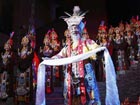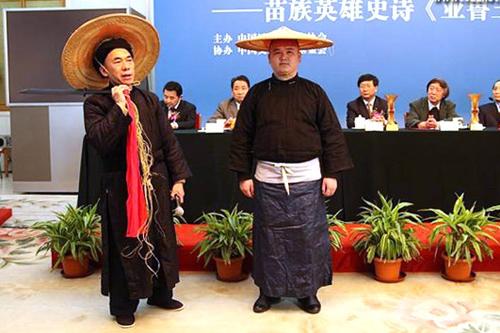| Videos | ? Latest |
|
? Feature | ? Sports | ? Your Videos |
Scholars look to preserve ancient works

 0 Comment(s)
0 Comment(s) Print
Print E-mail CNTV, March 6, 2012
E-mail CNTV, March 6, 2012
Ancient legends and folklore from China's diverse ethnic groups is an invaluable part of China's long and rich history. In order to keep these stories from vanishing with time, artists and scholars are painstakingly making efforts to reinvent the ancient heroic tales.
 |
|
King Yaru |
The "Epic of King Gesar" is about the life of a legendary and heroic king, whose song has been widely sung throughout central Asia since the 12th century. Tibetan and Mongolian singers have passed down the tradition orally over the centuries. The epic has attracted intense scholarly curiosity as one of the few traditions that have been passed down orally, to survive as a performing art.
In Chengdu, the Zhanqi Art Troupe created a dance drama to honor the legend. Simply entitled "Hero Gesar", the play is about a man who defeats demons, beats back invaders, and finally creates a harmonious life for his people.
Li Xining, head of Zhanqi Art Troupe in Chengdu, said "The dance drama is actually a combination of narrative storytelling, singing, acrobatics and live music performances. "
In the Mashan area of Guizhou Province, the legend of King Yaru has been passed down among the Miao people for centuries. But the epic was not known to the public until 2009, since there were no official versions of it, as performers usually recited chapters from memory. Three years ago, the China Folk Artists Association launched a project to collect, and publish the Miao masterpiece.
Liu Xicheng, researcher, said "According to ancient rituals, the performance must not last longer than 50 minutes, and the bards chose to abandon details so that the general story can be completed in time. So it's difficult for us to collect all the pieces."
Epics such as King Gesar and King Yaru have been works of cultural reflection and folklore rather than just being a form of entertainment. Local conflicts, religious trends are also reflected in the works, making their preservation all the more important.





